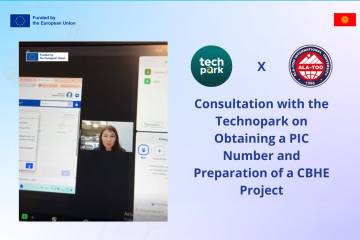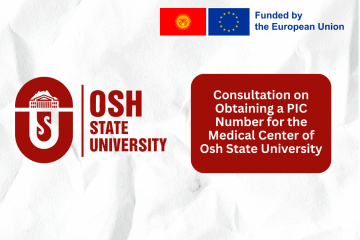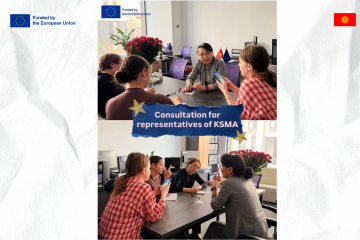The Regional seminar on “Role of Accreditation in Promoting Quality Assurance at HEIs” was orgized by the National Erasmus+ Office in Kyrgyzstan on 3-4 October 2018 at Park Hotel.
The main aims of the seminar were familiarize with EU experience and best practices in promoting quality assurance at HEIs and enhance knowledge and skills in this field on developing recommendations on legislative support for accreditation system in each participating country : Kyrgyzstan , Kazakhstan , and Russian Federation based on comparative analysis of their and European accreditation system .
Around 40 experts from 3 countries such as Kyrgyzstan, Russia ans Kazakhstan participated in the two-day seminar.
Mr. Kudaiberdi Kodzjobekov, deputy minister of Education and Science of the Kyrgyz Republic, opened the seminar by underlining the importance of quality assurance mechanisms at Higher Education Institutions.
Then Ms. Gulnara Chokusheva, National Coordinator of the Erasmus+ Office gave an overview of the objectives of the regional seminar and its activities.
The main speakers of the seminar were invited EU experts: Ms. Maria Kelo, Director of the European Association for Quality Assurance in Higher Education (Belgium) and Mr. Rafael Llavory, Head of national department agency of accreditation and quality control ANECA (Spain)
Ms. Maria Kelo, Director of the European Association for Quality Assurance in Higher Education (Belgium) presented the ENQA policies in the field of quality assurance in higher education. There are two main approaches to QA in Europe: in some it’s an accreditation procedure, in others an assessment / evaluation approach. The methods and formal outcomes of the two approaches are different, but the ultimate objective of both is to support the quality enhancement of programmes and institutions. Quality assurance agencies that are members of ENQA need to meet the European Standards and Guidelines for Quality Assurance (the ESG).
Some of the key standards in Europe include the independence of QA agencies and the impartiality of external experts; orientation to constant enhancement together with accountability; and integration of all stakeholders in the QA processes, including students. Involvement of internal and external stakeholders is important to foster a culture for quality.
There are different cultures and environments so each agency should take into account the framework and cultural environment in which it operates when creating its own procedures and standards while taking stock of the internationally accepted frameworks and principles.
Her presentation was followed by the presentation of Mr. Rafael Llavory, Head of national department agency of accreditation and quality control ANECA, Spain, who discussed A national framework for accreditation in case of Spain .
The Legislative framework of accreditation and its alignment with ESG in the participating countries were presented by National Expert on higher education reformation of three participating countries – Ms . Marina Skiba (Kazakhstan), Mr. Vitaly Kopnov (Russia) and Ms. Svetlana Sirmbard (Kyrgyzstan).
At the end of the first session EU experts gave instructions for working groups.
The working groups were moderated by Ms. Svetlana Sirmbard, Rector od ADAM University and member of HERE team, Ms. Onola Umankulova, Director of Agency for Quality Assurance in Education and Ms. Anguelina Popova, Director of the Center for Teaching, Learning and Technology of American University in Central Asia.
 1_National Quality Assurance Framework and Accreditation of HEIs_RUSSIA
1_National Quality Assurance Framework and Accreditation of HEIs_RUSSIA
 A national framework for accreditation the case study of Spain
A national framework for accreditation the case study of Spain
 An overview of ENQA aims, activities, and policies
An overview of ENQA aims, activities, and policies
 External QA in Europe – unity in diversity
External QA in Europe – unity in diversity
 Stakeholder involvement in QA practices A European overview
Stakeholder involvement in QA practices A European overview
 Training teaching staff in accreditation process – why and how
Training teaching staff in accreditation process – why and how


